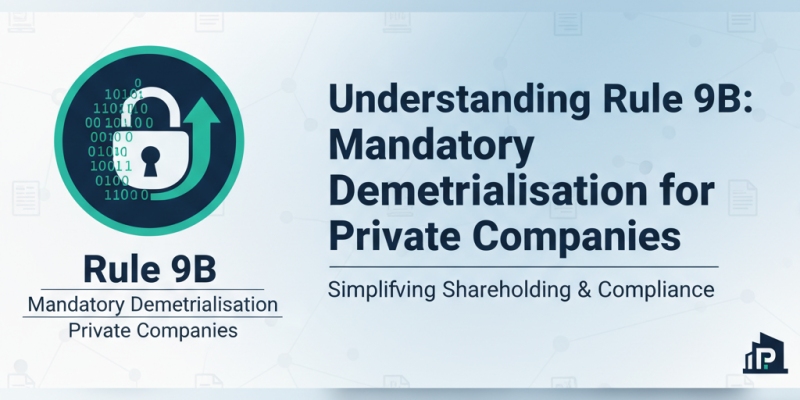In October 2023, the Ministry of Corporate Affairs (MCA) introduced Rule 9B, a pivotal amendment to the Companies (Prospectus and Allotment of Securities) Rules, 2014. This rule mandates that all private companies—with the key exception of “small companies”—must convert existing physical share certificates into electronic form (dematerialisation) and issue all future securities only in demat format.
This move is a significant step towards enhancing transparency, security, and efficiency in corporate governance.
Who Needs to Comply? The "Small Company" Exemption
The rule applies to all private companies, except for those that fall under the definition of a "small company" as per Section 2(85) of the Companies Act, 2013.
A company is classified as "small" only if it meets both of the following financial criteria:
• Paid-up Share Capital: Does not exceed ₹4 crore.
• Turnover: Does not exceed ₹40 crore, according to its last profit and loss account.
If a company crosses either of these thresholds, it loses its "small company" status and must comply with Rule 9B. Companies that crossed this threshold after March 31, 2023, must comply within 18 months of that financial year-end.
Which Companies Are Never Small Companies?
The Companies Act also specifies that certain types of companies can never be classified as small companies, regardless of their capital or turnover. These include:
• A holding company or a subsidiary company.
• A company registered under Section 8 (a non-profit organization).
• A company or body corporate governed by any Special Act (e.g., banking or insurance companies).
Key Requirements of Rule 9B
1. Mandatory Dematerialisation: Private companies must demat all existing physical share certificates and issue new securities only electronically.
2. Compliance for Key Stakeholders: Before conducting buybacks, bonus issues, or rights offerings, companies must ensure shares held by promoters, directors, and key managerial personnel are fully dematerialised.
3. Transfers & Subscriptions: Any shareholder wishing to transfer or subscribe to shares must do so electronically. Physical certificates can no longer be processed.
Why It Matters
Rule 9B significantly reduces risks like loss, theft, and forgery of share certificates. It streamlines share transfers, simplifies record-keeping, and enhances regulatory compliance, benefiting both the company and its investors.
If your company needs help with completing dematerialisation, obtaining an ISIN, or meeting compliance timelines, Nextgen Share Registry Pvt Ltd (Nextgen RTA) is here to support you. We will help you navigate Rule 9B smoothly, ensuring you remain compliant, efficient, and investor-ready.

